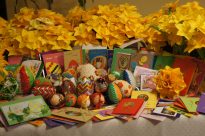We are happy to share the project story of the EUPCA 2015-2017 alumni Joanna John!
The project “Non-medical forms of assistance for terminally ill cancer patients. Wide-range training for volunteers” was provided by Archdiocesean Home’s Hospice bl. John Paul II from September 2015 to February 2017. It was addressed at people without medical experience, but with a strong interest in helping and supporting hospice patients.
The projects main objective was to teach forms and practices for implementing this support, drawing on participants’ individual abilities or even their free time.
Students Faculty of Pedagogy and Psychology, University of Silesia, participated in the project’s first module. Here, they could learn to improve their communication with patients in the terminal stage by means of a lecture and a subsequent practical training. A variation of important topics was addressed, including Active Listening, Troubles in Communication, Volunteer Self-Protection and others.
As a next step, participants had the chance to apply their newly gained knowledge in a ward by talking and being with patients. At the end of the module participants had prepared workshops for our hospice’s volunteers with minimum stay of one year. These workshops focused on the communication with patient relatives as well as managing difficult situations. Our volunteers could also use these workshops as a welcome opportunity to exchange their knowledge.
 Voluntary Work in Action was the subject of the next two modules. It revolved around educational meetings in kindergartens, schools, parishes etc. in Silesia Voivodeship. We promoted palliative care in these institutions and invited people to become our volunteers in action. Interested people could then participate in fairs, collections and other projects as for example the one of Mrs. Iwona, one of our volunteers. She began her volunteer work by preparing beautiful and unique handicraft paper-daffodils to sell at the fair. By now, she has become a corporate volunteer – as a PKO employee – and helps us cooperate with the PKO Foundation which kindly gave us a donation as well. As indicated above, an important part of our project was the development of manual activities for patients. We used different techniques in our workshops, for example decouphage and artichoke handicraft, among others. This way, we could find out which techniques and materials will be suitable for our patients. This activity drew a lot of support by elderly people who helped us prepare handicrafts for the fair. In the first module, too, elderly people were among those helping out the patients, for example by spending time with them in the ward.
Voluntary Work in Action was the subject of the next two modules. It revolved around educational meetings in kindergartens, schools, parishes etc. in Silesia Voivodeship. We promoted palliative care in these institutions and invited people to become our volunteers in action. Interested people could then participate in fairs, collections and other projects as for example the one of Mrs. Iwona, one of our volunteers. She began her volunteer work by preparing beautiful and unique handicraft paper-daffodils to sell at the fair. By now, she has become a corporate volunteer – as a PKO employee – and helps us cooperate with the PKO Foundation which kindly gave us a donation as well. As indicated above, an important part of our project was the development of manual activities for patients. We used different techniques in our workshops, for example decouphage and artichoke handicraft, among others. This way, we could find out which techniques and materials will be suitable for our patients. This activity drew a lot of support by elderly people who helped us prepare handicrafts for the fair. In the first module, too, elderly people were among those helping out the patients, for example by spending time with them in the ward.
How I can help? Is it a place for me? These questions indicate the general doubt among the people thinking about volunteering in hospice. The reason behind our project was the idea to answer these questions. Therefore, we can show potential candidates a variety of forms to be of help for people in the terminal stage. EUPCA’s project shows how much volunteers support palliative care.
Author: Joanna John, Volunteer coordinator
